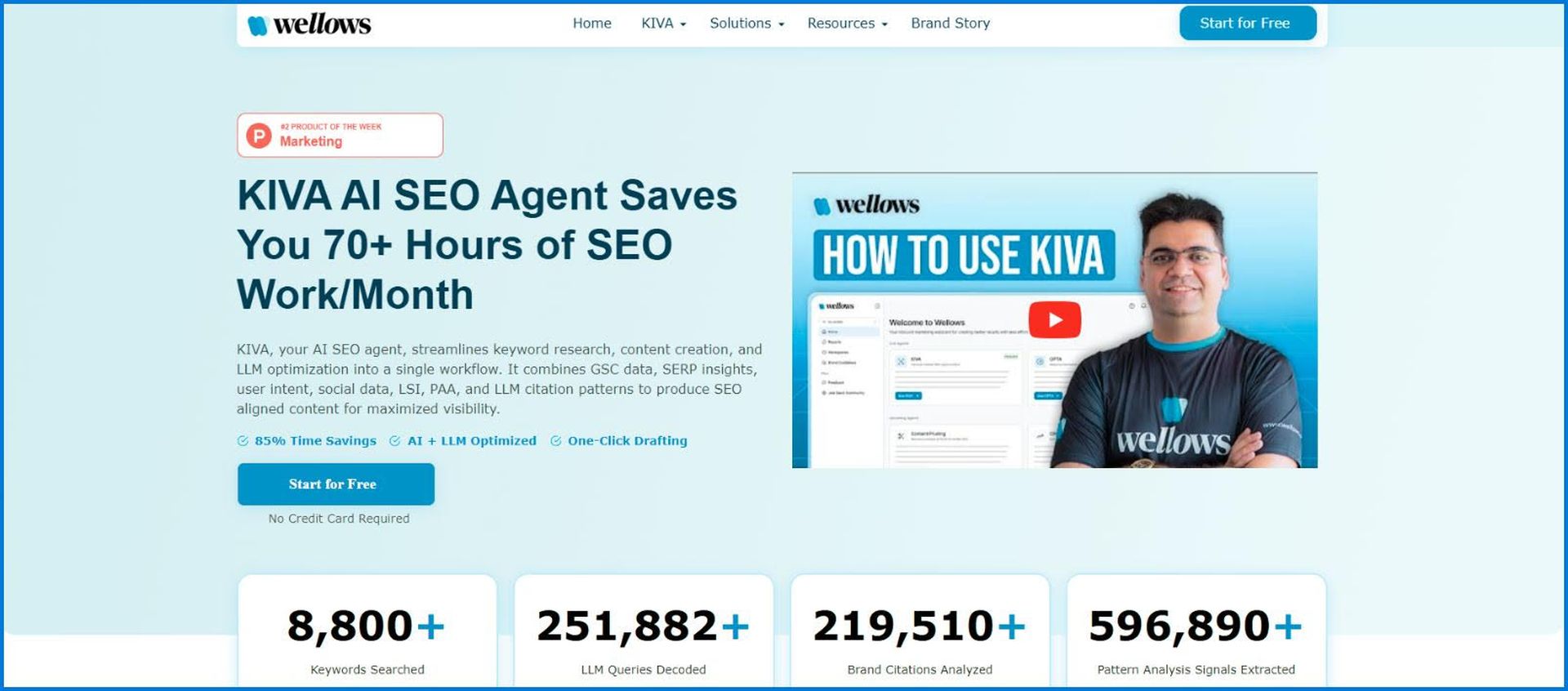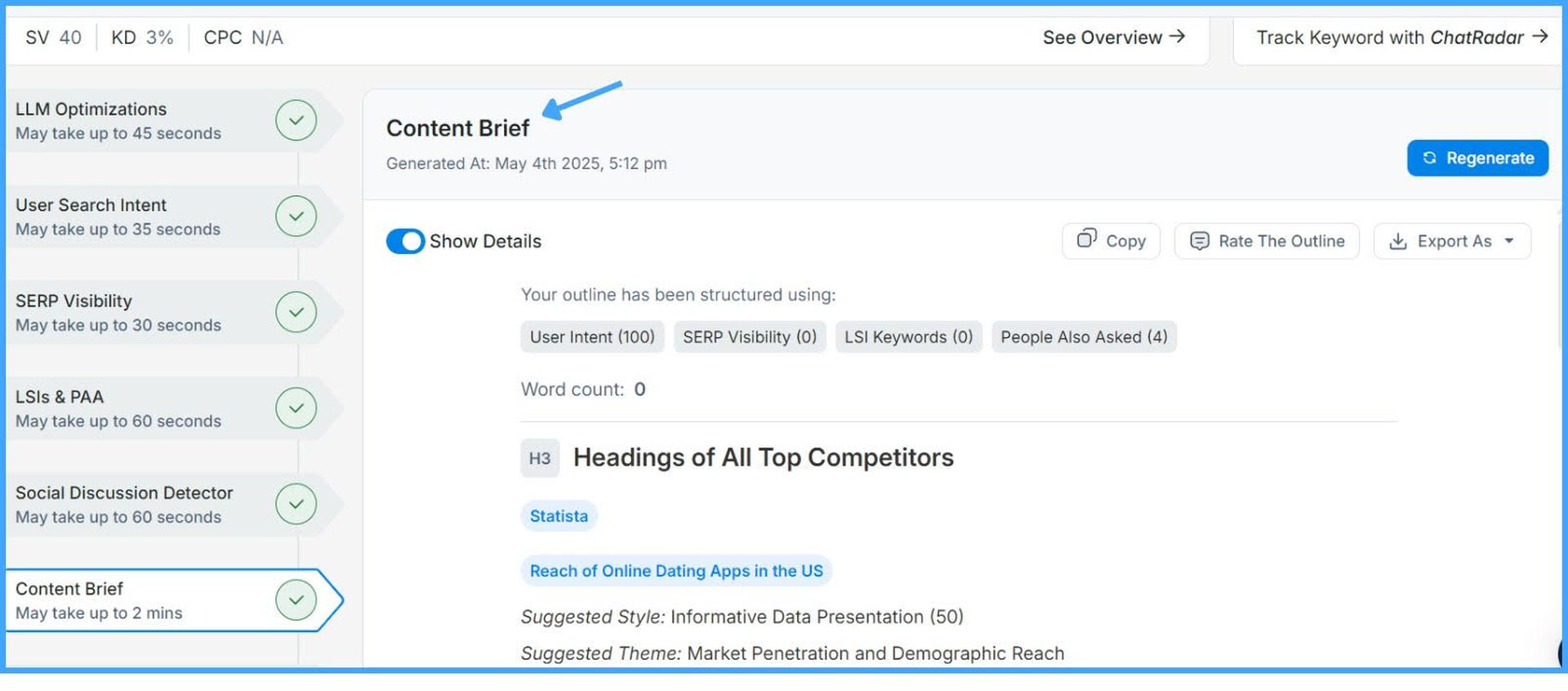Most SEO teams don’t struggle to find data, they struggle to act on it. With insights pouring in from keyword tools, analytics dashboards, and SERP trackers, the real challenge is turning all that noise into a focused strategy.
For teams stuck in fragmented systems and repetitive tasks, Wellows provides a smarter way forward, streamline marketing with automated workflows, brand-consistent content creation, and a unified approach that cuts through the complexity.
That’s where KIVA comes in, the AI SEO agent from Wellows that uncovers strategic opportunities, eliminates manual busywork, and transforms real-time search insights data into execution-ready content with speed and precision.
Why is traditional SEO no longer enough?
The old way of doing SEO was built around manual steps, researching keywords, analyzing SERPs, building outlines, writing content, and then repeating the process.
These steps still matter, but they’ve become increasingly difficult to scale. With user behavior changing rapidly and AI models reshaping how content is delivered, traditional SEO processes often fall behind.
What used to be a quarterly strategy now needs to be adjusted weekly. And with growing pressure to perform across both search engines and AI-generated platforms, marketers can’t afford to rely on slow, disjointed workflows.
How does AI automation improve decision-making?
AI isn’t just good at processing large volumes of data, it’s good at identifying what matters within that data. This is where an AI SEO agent developed by Wellows stands out.
KIVA connects directly to sources like Google Search Console and analyzes real-time patterns across queries, user intent, and SERP changes.
It doesn’t just show you what’s happening, it tells you what to do next. From identifying content gaps to suggesting high-impact topics, it helps marketers turn raw insights into clear actions.
The best part? It works in the background. While your team focuses on strategy and messaging, KIVA takes care of clustering keywords, mapping intent, generating outlines, and even preparing first drafts.
How does AI help align content with changing user behavior?

Search behavior doesn’t stay still. A keyword that signals research today might indicate buying intent next month. KIVA monitors these shifts and adjusts your content recommendations accordingly.
By analyzing live search data and observing how users interact with AI platforms like ChatGPT, Claude, and Gemini, it can recognize when intent changes and adjust strategy in real time. Instead of relying on static personas or outdated assumptions, you’re working with live audience signals.
This makes your content more relevant, not just to search engines, but to real people in real time.
Can content be optimized for both Google and AI platforms?
As more users turn to large language models to get answers, brands need to think beyond Google rankings. LLMs like ChatGPT don’t just pull from top results; they cite structured, trustworthy content that’s formatted for easy interpretation.
KIVA helps with this by analyzing what types of content LLMs are referencing in your industry. It builds outlines and content frameworks that follow those patterns, making your content more likely to appear not just in search results, but in AI-generated summaries and responses.
This dual-channel visibility is becoming essential for any brand that wants to stay ahead.
What does a streamlined, modern SEO process look like?

With AI automation in place, the SEO process starts to look very different and much more efficient. Here’s how KIVA simplifies the entire workflow:
- Keyword discovery is powered by real query data, LSI keywords, and topic clustering
- Search intent is automatically identified and mapped to funnel stages
- SERP and LLM visibility are tracked and used to guide content creation
- Outlines and content briefs are created with SERP Analysis with User Intent
- First drafts are written, scored, and prepared for review or publishing
- Everything integrates no more too or disconnected spreadsheets
This doesn’t just save time. It creates consistency. Your team can build content faster, but also with more confidence that it will perform where it matters.
What does this mean for SEO teams moving forward?
The future of SEO isn’t about working harder, it’s about working smarter with the right systems in place. AI SEO agents are changing what’s possible by taking the guesswork and grunt work out of the equation. As AI continues to redefine SEO automation, platforms like Starlight Communications are expanding the concept of data-driven marketing beyond search performance. Their solution transforms online reputation data — sentiment, mentions, and emerging narratives — into actionable insights that complement automated SEO strategies.
Instead of managing five tools and three processes to create one piece of content, teams can focus on strategy, quality, and results while the backend work runs on autopilot.
Final thoughts
AI-driven SEO automation isn’t just about getting things done faster. It’s about getting them done smarter with more clarity, more consistency, and less guesswork. As platforms evolve and user behavior continues to shift, sticking to outdated processes puts even the most skilled teams at a disadvantage.
The combination of real-time data, intelligent automation, and user-focused insights offers a new way forward, one where strategy isn’t slowed down by spreadsheets, and content is built to perform across both traditional and AI-driven platforms.
For SEO teams ready to move beyond manual methods and fragmented workflows, now is the time to rethink how strategy gets done and let automation take on what no longer needs to be manual.





